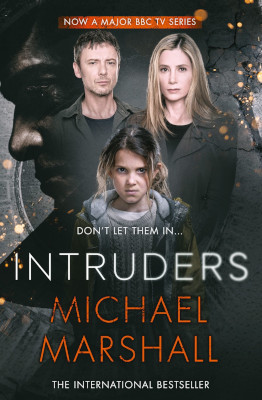I discovered the work of Michael Marshall Smith while discovering the Intruders series. His novels remarkably blend genres: science fiction, crime, horror and philosophical speculation, with an influence of Philip K. Dick which fades as the writings gain in maturity and personality. The texts of this great writer are thus difficult to classify or rank and are all thrilling and very endearing, especially the trilogy of straw men. A work to follow, very strong stimulation of the imagination.
Only Forward (1994)
A little boy in his room meets a headless man who telepathically asks him for help, but it was only a dream … The novel switches immediately to a police intrigue finely articulated to a universe of science fiction quite original where the main character must, to find a missing engineer, start by fighting his own paying domestic equipment. The work of Philip K Dick thus crosses all the first novels of Michael Marshall Smith, who nevertheless shows his capacity to pose a universe that belongs only to him.
We travel through this strange world as in an investigation turning into an adventure, exploring a gigantic city whose architectural partitioning expresses very strict social barriers, like a futuristic and tyrannical dystopia on a continental scale. We visit the Colored district, the Red, the Stable, the Sound that hates the noise, the Cats District reserved for the true lovers of these little animals, the Center Action, others… What became of our world, what happened in this seemingly anhistoric universe that evokes Robert Sheckley? There is hardly time to wonder in the ultra fast course through a nesting dolls universe that must have a key, especially since this world does not seem to be the only reality.
The various elements of an increasingly complex history are perfectly articulated among themselves without falling into the somewhat gratuitous philosophical speculations which are encountered in the two later novels. First very promising novel, completely crazy and very rich, UFO deserving a reading that will not leave indifferent.
Spares (1996)
Spares is a tangle of horror nesting dolls. Initially a police intrigue, the novel opens with an investigation that knows how to keep the reader in suspense through a lot of action, violence and twists. Jack Randall’s world is science fiction, whose speculative elements are used to create a sense of carnal horror deepening the darkness of this universe. It all begins in a very dark dystopian urbanism that owes much to Philip K Dick (again) and his sets of intelligent and paying machines, a recurring element in the universes of Michael Marshall Smith. Curiously, one dries out of the dystopian architecture with a second nesting doll : farms of breeding human clones, constituting a reserve of organs in a context of conspiracy carried out by the powers of money. The third level of horror still leads to abandoning the previous doll trundle, and expresses ontological worries on the occasion of the massive Internet diffusion in society at the time the novel is written.
Neither cyberpunk nor Ghost in the Shell, the novel entrusts cats (another recurrent theme in the author’s early novels) to a world that is not really a parallel universe or a purely psychological collective unconscious, but a little of both, articulated to the personal journey of the main character. And violence, as ever, remains. The conclusion of the novel will probably be blamed for not being able to truly unify all the elements of this complex and confusing story.
With this well-structured plot that keeps his reader in suspense without drowning in hazardous philosophical speculations, Michael Marshall Smith pursues a complex and challenging journey that poses a more ambiguous universe than his first novel did, straddling a thriller and science fiction where one wonders which is the pretext for the other, fault to actually merge them. Spares is like a transition from a very successful first novel to the trilogy of Straw Men, a much more personal and affirmed expression of a writer in whom the exploration of the human soul’s darkness is a constant, tastefully converted into into an original and surprising novel.
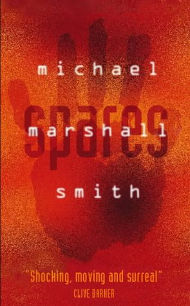
One of Us (1998)
This novel mixes science fiction and detective novel as Philip K Dick has set the model, but here we depart quite little from the police intrigue despite the many futuristic elements, like these talking, intelligent and especially paying machines borrowed from PKD. The theme of artificially implanted memories is also used, but not at all as a “pleasant” recollection of things not experienced (cf the movie Total Recall, same author): it’s about renting his brain to those who can pay for getting rid of some of their memories. But what would happen if a person who remembers a murder was taking a polygraph test with this memory not belonging to him? Who is the murderer, what about the original owner of such a memory, which he got rid of and will not recognize as his own?
The character of Hap Thomson thus conducts an intense investigation for his own survival in a black and violent universe. He will discover a whole machination of considerable social size, which prefigures the conspiracy of the trilogy of straw men, Smith’s masterwork . The plot does not want to be maintained at the level of the detective novel. If the science fiction elements fail to pose a truly convincing universe, Michael Marshall Smith takes us into metaphysical and cosmological speculations that are quite vertiginous and surprising, leaving the narrative to pose the elements of a confusing conclusion that completely alters the meaning of the whole plot.
If this novel gets to captivate by the action it deploys during its major part, one may appreciate perhaps more the following trilogy it prefigures. Philip K. Dick better embodied a metaphysical uneasiness in his characters without the narrative dissolving in abstractions comparable to Leibniz’s work, conceptual justifications less.
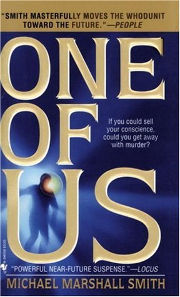
The Straw Men (2001) – The Lonely Dead (2004) – Blood of Angels (2005)
Ward Hopkins goes to the funeral of his parents, dead in a car crash, and discovers a very strange farewell message for victims of an accident … Sarah Becker, a teenager, is kidnapped by a criminal maniac which a detective haunted by his past, John Zandt, will strive to find. Nothing but very ordinary in these two intrigues which will end by being overlapped … But when a level of conspiracy is raised, another one is always uncovered, and each discovery is accompanied by a destructive journey. By definition, every conspiracy is careful to protect itself all the more powerfully because its ramifications have long stretched far into political and financial circles. There is no reverse.
The universe of these three novels does not multiply speculative elements and no longer belongs to science fiction nor even to fantasy. The label “police novel” does not even bring much. Everything takes place in the United States, mainly in the West and North West through multiple sparsely populated places, even in the wilderness or the Oregon’s immense forests. This world is globally like ours, but the very deep stakes of his plot cast a worried look at our social and political reality.
In his early novels, Michael Marshall Smith explored the links between ontology, cosmology, depth psychology, computer or robotic universes, and money and power-financed conspiracies. The trilogy of Straw Men develops his true predilection theme which links all his works together: the depth of a conspiracy that blackens the universe of men and its history. If there are still multiple and overlapping intrigues, it is no longer to lose the reader in hazardous speculations. The theme of the double, fantasy classical, gives a backdrop to a fully coherent plot that is gaining momentum along hundreds of pages that are greeted with real delight, deepening the very solid psychology of the characters as they go along. The reader discovers their personal history, inseparable from a very old conspiracy. The three volumes are thus inseparable and form a single work, the end of which remains as open as the origins of this history which is lost in the night of time, in neolithic tumuli, in the unhealthy fantasies of too rich men, and in forests too isolated to be truly deserted.
A black, violent universe of adventure without return for those who have the misfortune to lift a corner of the veil behind which there are no sprawling monsters coming from beyond space, but simply our fellows humans. To what extent are they really such?
The masterpiece of Michael Marshall Smith.
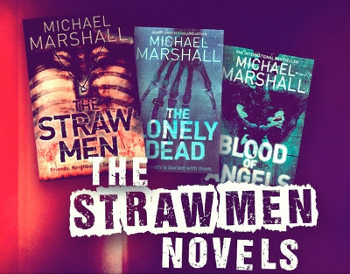
Intruders (2007)
Reading a novel after having seen the adaptation to the cinema, or the opposite, can be very disappointing. On the other hand, discovering a novel at the same time the television series is airing is a very strange back and forth experience. I find it very difficult to disregard the faces and places of the TV episodes, and especially the dazzling interpretation of the young Millie Brown. The strangest still remains the disturbing atmosphere of this story that comes under the darkest fantasy.
Are we the one we think we are? Are our loved ones really those we think we know, or can they, after a disturbing absence, become more and more someone else, like another person? What could be discovered in the daily life of the one who shares our lives, by watching his colleagues and his workplaces like a detective would do? Such surveillance can even be dangerous… Parallel history: upheavals of personality have something profoundly disturbing when they occur in the life of a runaway little girl, knowing too much things too unhealthy about the world, the life and others. What monsters can inhabit in ourselves? Mental illness ? Can one be remotely guided, controlled by an obscure magic? Reincarnation? All this at the same time, or something else?
Michael Marshall Smith picks up a central theme of fantasy in this detective novel that mixes the boundaries of genres. The most terrifying thing is not so much the haunted house, not even being haunted, but discovering that his loved ones are, and that there is a deeply undesirable intruder who can no longer be dislodged from his intimacy, of its daily life, and which will reduce our life in crumbs. A captivating story and an adaptation in a television series of 8 episodes that knows how to deviate from the original plot by highlighting all its darkness.
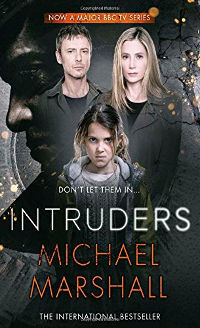
Killer Move (2011)
The more pretentious and superficial, the more deserving of punishment. Did Bill Moore, an ultra-connected real estate agent in Florida who wanted to become rich and powerful as quickly as possible, to the detriment of his associate too mediocre for him, really deserved what was awaiting? The world is a vast conspiracy : here is a classic gist of a narrative. But it is always difficult to discover that your own daily life and your person are the object of such a manipulation, and the changes are particularly rapid and brutal. Who is pulling the strings? This small label, “MODIFIED” – was clear, but could Bill Moore understand that what had been changed was himself?
Such a type of plot can give rise to various developments belonging to science fiction. Michael Marshall Smith chooses to confine himself to the “real” world in a novel that can be called “thriller” if everything has to be labelled. There is a conspiracy whose main character is only a very secondary piece. The rather loose articulation of this conspiracy to the trilogy of the Straw Men is not surprising, but this novel remains autonomous and does not constitute a sequel. The reader should particularly appreciate a continuation of this exploration of the human soul’s darkness and the complexity of cruel plots which treats real lives as simple toys.
By the end, a question remains: what is the degree of personal resentment that the author projects on his main character, the ultra connected e-rich and e-real estate agent Bill Moore? But can we really blame him for attacking this type of icon?
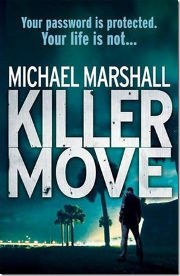
Yves Potin
